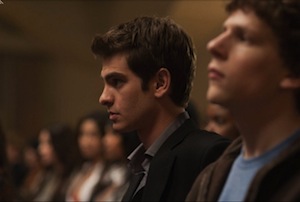Re: Diversity (in film)
I just finished a course called “Race and Ethnicity in American Cinema”. This was probably one of the best ways to satisfy my American Cultures requirement, and Professor Wagner is great. Nevertheless, I am still not good at analyzing “race and ethnicity in XYZ”, largely because I still don’t think like that.
We talked a fair amount (more so early on in the semester) about blackface and yellowface, after watching The Jazz Singer and The Bitter Tea of General Yen. These are different in that the first has a character (a white character) in blackface, while the latter has an actor (playing “General Yen”) in yellowface. General Yen is better than it sounds from this incomplete description, but that’s not the point of this post. What I did note at the time (but which we didn’t get to discuss) was the fact that yellowface seemed to be socially considered less offensive than blackface.
Okay. So yellowface is offensive too, right?
This post is a response to part of something from almost a year ago. The original post is also on Facebook along with comments. Here’s the bit that’s relevant:
That’s the background. Fast-forward to last year’s “racebending” debacle; for those who didn’t hear about it, the good guys in The Last Airbender (the movie) were all white, with a casting call looking for Caucasion actors more than other races, and the bad guys were of darker complexion. Active discrimination is still alive, even if in such a passive form. It’s also been institutionalized, however, meaning that people’s expectations, and their expectations of others’ collective expectations, are well set-in and slow to change.
That’s no excuse, of course. But there was also a recent conversation in our family about the movie 21. Apart from being very dramaticized, there was apparently much controversy over the characters being mostly white, even though the real-life people they were based on were mostly Asian. But, from Wikipedia:
Jeff Ma, who was the real-life inspiration for the character Ben Campbell and served as a consultant on the film, was accused of being a “race traitor” on several blogs for not insisting that his character be Asian American. In response, Ma said, “I’m not sure they understand how little control I had in the movie-making process; I didn’t get to cast it.” [5] Ma said that the controversy was “overblown” and that the important aspect is that a talented actor would portray him. [6]
That last bit’s the part I think is more important; there’s another part where he said he would be mad if they got some random Korean actor to play the character just because he’s Asian. It’s true that the collective Asian-American image does not get the benefit of this movie. But from the perspective of the story, there’s no particular reason to pick any particular race.
This is where [Virginia] Woolf’s words are important again: Remember not to take sides! … Yes, there were more considerations than that which would have biased the studio towards white actors, and still do today. But is there anything inherently wrong with Jim Sturgess (he’s not American, either!) playing a character based on Jeff Ma? In this story?
Well, in The Social Network…

Max Minghella isn’t Indian-American, he’s Italian/Chinese/Scottish-British. Does that matter?

Andrew Garfield isn’t Brazilian-Jewish-American. (He’s American-Jewish-British, as it turns out.) Did that matter?

Armie Hammer isn’t actually two people. He and body double Josh Pence aren’t actually twins. Does that matter?
